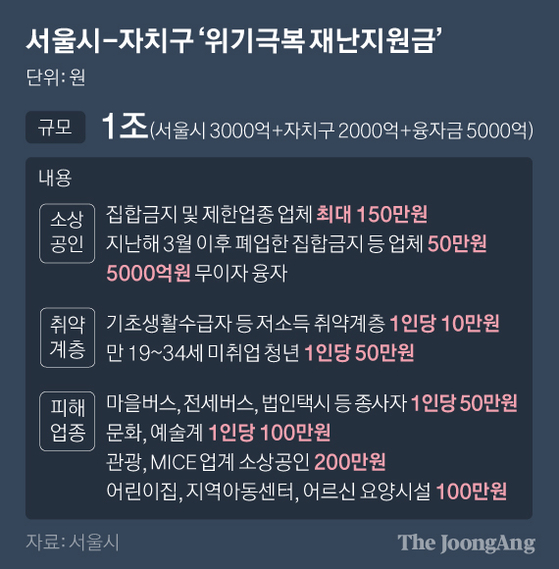
Seoul-Autonomous District’Disaster Support Fund for Overcoming Crisis’. Graphic = Reporter Park Kyung-min [email protected]
Seoul decided to release 1 trillion won when the local economy became difficult due to the new coronavirus infection (Corona 19). Seoul and 25 autonomous districts each paid 300 billion won and 200 billion won, and added 500 billion won in interest-free loans for small business owners. The target of support is expected to reach about 335,000 companies and 700,000 people. In line with the government’s fourth disaster subsidy schedule, it plans to start payment in early April.
Seoul Mayor Seo Jeong-hyup held a briefing on the 22nd and said, “Seoul has taken preemptive and drastic quarantine measures from the beginning of the spread of Corona 19, and the damage to business has been greater than in other regions, and as there is a specificity of high fixed costs such as rent, it is necessary to provide broader support It is the goal,” he said. The intention is to look into places where the government’s 4th disaster subsidy cannot be reached.
“Filling the blind spot of the 4th government subsidy”
“This measure is the third measure to support the public welfare, following ‘800 billion won low-interest loan’ and ‘1.5 trillion won’s 5 major warmth measures for people’s livelihoods’,” said Seo. Since then, about 6 trillion won, including national expenditure, has been put into overcoming the corona.”
The fields of support are largely divided into small businesses, vulnerable groups, and affected industries.
First of all, 275.3 billion won will be invested to support small business owners who suffered the most damage. Apart from the government’s 4th disaster subsidy, an additional’Seoul Economic Vitality Fund’ of 600,000 to 1.5 million won will be given to 275,000 businesses that are prohibited or restricted from collectively.

Seo Jeong-hyup acting as the mayor of Seoul. Newsis
A 500,000 won’damage subsidy’ will be provided to small business owners who are not included in the government’s fourth disaster support fund. This applies to businesses that are prohibited or restricted from collectively closing after March 22, last year, when social distancing began to be strengthened after maintaining the business for more than 90 days. It can be duplicated with the government’s “re-challenge incentive” Interest-free loans for small business owners are also being implemented for the first time. With a maximum of 20 million won and no interest for one year, Seoul expected a total of 25,000 people to benefit.
Tourism industry 2 million, low income class 100,000 won
135.1 billion won will be invested to support the vulnerable. A “employment incentive” of 500,000 won per person is provided to 170,000 unemployed young people who are unemployed due to the Corona 19 incident. The Seoul Metropolitan Government explained that it will provide a local love gift certificate for 500,000 won to all unemployed young people aged 19 to 34 within two years after graduation so as not to overlap with the Youth Allowance. About 450,000 people from low-income vulnerable groups, such as basic living recipients, receive a “living support fund” of 100,000 won per person.

On the 25th of last month, the Seoul City Council mayoral council announced on the 25th that it would provide a disaster support fund worth 500 billion won in cooperation with the city of Seoul. From left: Yangcheon-gu Officer Kim Soo-young, Dong-jin Lee Dong-jin, Dobong-gu Officer, and Seongdong-gu Officer Won-Oh. yunhap news
The city of Seoul announced that it will also operate tweezers support measures for the affected industries. About 30,000 people, including village, charter, airport bus, and corporate taxi transport workers, whose livelihoods are threatened by a decrease in passengers, are paid 500,000 won per person’damage subsidies’. Up to 1 million won per company will be paid to nursing homes for the elderly who suffer from high-intensity quarantine measures, regional children’s centers where operating costs are high due to emergency care, and daycare centers that suffer from prolonged closures.
One million won per person will be paid to 10,000 cultural and artistic people who face a livelihood crisis due to the cancellation of exhibitions and performances. 5,000 small businesses in the tourism and MICE industry are provided with 2 million won in addition to the government’s disaster subsidies.
Acting Seo said, “So that citizens, including small business owners and self-employed people who have endured and endured, will once again give strength to overcome the hurdles and finally meet the time of hope. “We will promote the’Disaster Subsidies’ support without a hitch,” he said.

View of Seoul City Hall in Jung-gu, Seoul. Newsis
Cadastral point of “establish principles and consider after payment”
The city of Seoul announced that the budget for this support was covered by the Disaster Management Fund. The borough plans to finance its net world surplus (the balance of taxes earned minus total expenditures).
However, there is also a critical view that this is not a sensational support in connection with the announcement of a large-scale support plan in step with the government ahead of the re-election in April. Until now, the city of Seoul has expressed difficulty in compensating for losses directly to small business owners in the affected industry due to lack of budget. In order to provide legal basis for support for unemployed youth, some autonomous districts enact and amend ordinances.
Jeong Jae-hoon, a professor at the Department of Social Welfare, Seoul Women’s University, said, “The government and local governments fail to establish the principle of how to pay the subsidies from the first disaster subsidy to the present one year. It is necessary to consider the future effects of the subsidy payment, such as what relationship with the existing youth allowance, and the situation after payment. If you apply without worrying about that, there will be controversy that it is for election use,” he said.
Reporter Choi Eun-kyung [email protected]
![]()
